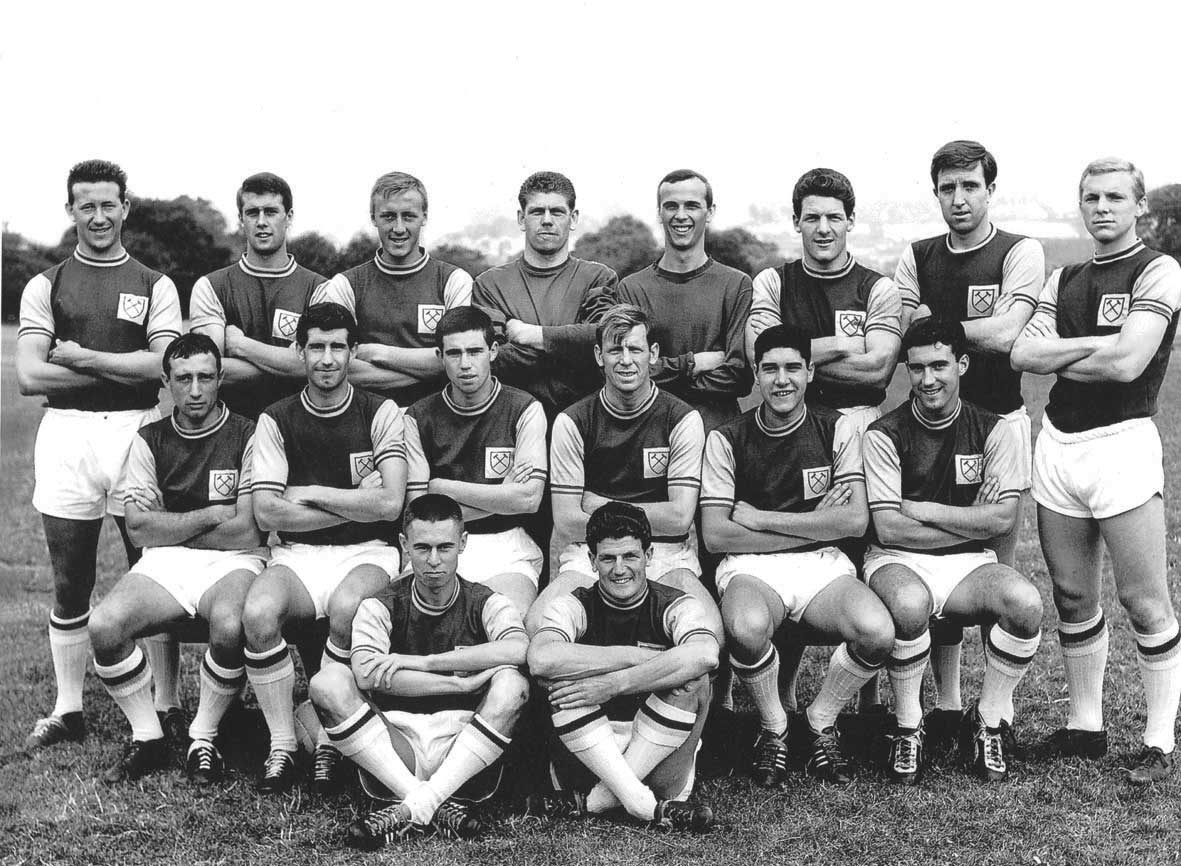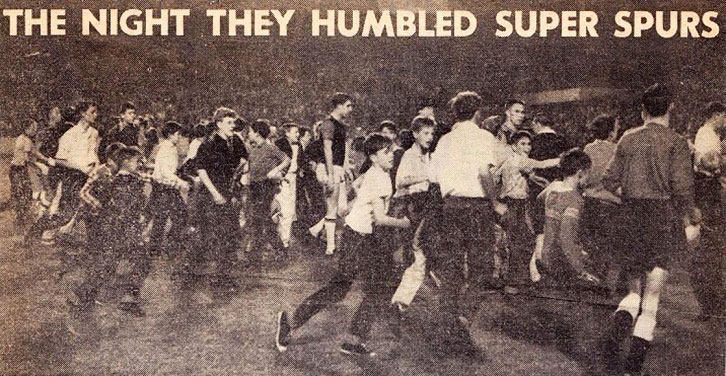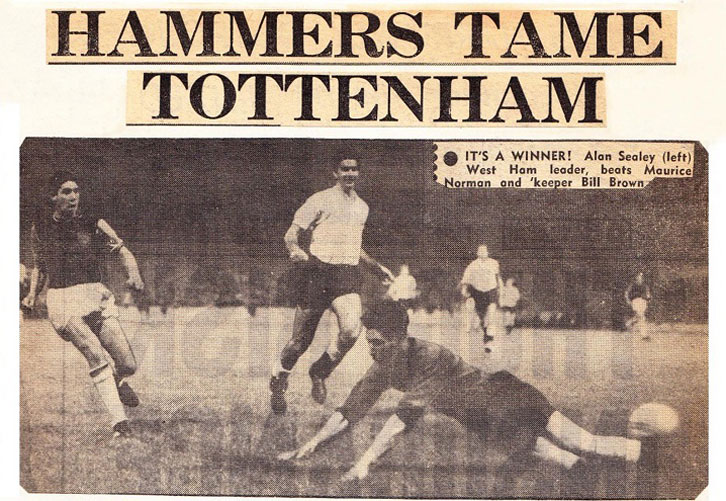West Ham United 2 Tottenham Hotspur 1
Scott, Sealey L.Allen
Football League First Division, Boleyn Ground, 28 August 1961
West Ham United: Lawrie, Kirkup, Bond, Malcolm, Brown, Moore, Scott, Woosnam, Sealey, Dick, Musgrove
Tottenham Hotspur: Brown, Norman, Baker, Henry, Blanchflower, Marchi, Jones, Dyson, L.Allen, B.Smith, J.Smith
Alan Sealey will forever be known as the man whose two goals fired West Ham United to European Cup Winners’ Cup glory at Wembley Stadium in May 1965.
While his double-strike that Wednesday evening will forever remain the outside right’s crowning moment in Claret and Blue, Sealey had also hit the headlines four years earlier when his goal downed reigning Double winners Tottenham Hotspur.
Then just 19 and making only his tenth appearance for the Hammers, the young forward settled a breathtaking match described by one newspaper as ‘a victory for British football’.
Hampton-born Sealey had joined West Ham the previous year, 1960, from near-neighbours Leyton Orient, for whom he had played just four League matches and scored only one goal.
Despite his inexperience and youth, the teenager was given a first-team debut by new West Ham manager Ron Greenwood at Leicester City on 2 April 1961, three weeks before his 19th birthday, and he remained in the side for the remainder of the 1960/61 First Division campaign.
Having netted his first goal in Claret and Blue in a 1-1 home draw with Manchester City on 15 April 1961, Sealey began the 1961/62 season in the team and went on to have the most prolific campaign of his career, with eleven goals.
The second and most important of those strikes came against Bill Nicholson’s all-conquering Spurs at the Boleyn Ground on Bank Holiday Monday 28 August 1961.
To put Sealey’s strike into context, Tottenham had romped to the title the previous season, winning 31 and losing just seven of their 42 league matches, while scoring 115 goals. The Lilywhites had also defeated Leicester City 2-0 at Wembley to lift the FA Cup, completing the first domestic ‘Double’ since Aston Villa had achieved the same feat in 1897.
West Ham, meanwhile, had finished 16th, with long-time manager Ted Fenton leaving the Club in March 1961, and 39-year-old Arsenal assistant manager Greenwood selected as his replacement.

Tottenham had kicked-off the 1961/62 season in good form, too, winning at Blackpool, drawing at home with the Hammers and then scoring a thrilling 4-3 North London derby victory over Arsenal.
Two days after that success, Spurs travelled seven miles south east for their third capital clash in the space of six days. What ensued was a thrilling 90 minutes of football that resulted in one of the finest victories West Ham have ever achieved.
To further put the Hammers’ victory into context, the East Enders had not won in their previous ten matches and went into the game sitting 14th in the table. In short, nobody expected them to beat Nicholson’s footballing aristocrats.
The opening half was a whirlwind of fast, free-flowing attacking football, with ‘West Ham leading the ratio of goal raids ten to one’, according to one report.
Malcolm Musgrove, Sealey and Phil Woosnam had all gone ‘within an eyelash of scoring’ as Greenwood’s side ripped into their opponents without fashioning the opening goal. At the other end, Spurs wing-half Tony Marchi hit the upright.
The Hammers finally gained the reward for their endeavour six minutes before half-time, with Sealey heavily involved. The teenager forced Tottenham goalkeeper Bill Brown into a flying save, but the Scotland international was powerless to prevent another 19-year-old, Tony Scott, from lashing in the rebound.
 Into the second half and, perhaps expectedly, Spurs came back into the game and began to show the class, spirit and ability that had won them so many plaudits, and honours, the previous season.
Into the second half and, perhaps expectedly, Spurs came back into the game and began to show the class, spirit and ability that had won them so many plaudits, and honours, the previous season.
On 64 minutes, Tottenham equalised. A long throw from Johnny Smith was flicked across the goalmouth by namesake Bobby, and Les Allen – father to future West Ham striker Clive – beat goalkeeper Lawrie Leslie to the ball. His shot came back off the post, but the alert inside-forward buried the follow-up.
While modern-day teams may have settled for a point – West Ham content to draw with the champions for the second time in a week; Tottenham happy to maintain their unbeaten start on enemy territory – but not a bit of it.
Both sides continued to attack with abandon, passing and moving and pulling their opponents all over the pristine Boleyn Ground pitch.
The winning goal came 14 minutes from full-time and showed West Ham’s incisive counter-attacking at its best.
A Tottenham raid ended with the ball in the hands of Leslie. The Scottish custodian hurled the ball out 40 yards to John Dick, who turned, ran and burst between Maurice Norman and Tottenham captain Danny Blanchflower.
Now well inside the Spurs half, Dick pushed a precision pass to Sealey, who raced inside Ron Henry and lashed an unstoppable low shot past Brown and into the far corner of the net.
The majority of the 36,348 crowd crammed inside the Boleyn Ground erupted in delight – a new hero was born. Sealey threw his arms into the air in sheer elation.
Amid all the excitement, West Ham captain Woosnam turned to Leslie and gave him the thumbs-up. Had it not been for the goalkeeper’s quick thinking, Sealey would never have been given the chance to write his name into the history books as the man who had downed the champions.

Understandably, the press praised Greenwood and his players following their eye-catching success.
‘Wonderful West Ham crush the Spurs’ read one headline, while another focused on the matchwinner Sealey, crowing ’Hammer of the Spurs – 19-year-old leader grabs the glory’.
One reporter, Bill Holden, could hardly contain his excitement at covering such a landmark moment in both the career of Sealey and the history of the Club he represented.
“All there has ever been to stir the blood and excite the emotions was crammed into this pulsating match,” wrote Holden. “Right from the start, West Ham went out to end a run of eleven League games without a win – and became the first team this season to humble Spurs, the side which has beaten England.”
Another report said the encounter had illustrated everything that was good about English football.
“Real Madrid, Barcelona, Benfica, Milan… you can have the lot! In the heart of London’s Cockney land last night, wonderful West Ham licked skilful Spurs in one of the greatest club matches you could ever wish to see.”
It was also one of the greatest matches the Boleyn Ground witnessed in its 112-year existence.
